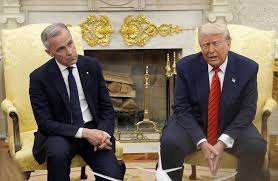
Introduction
The intersection of global economics and political leadership has never been more pronounced than in the era of Donald Trump’s presidency. Mark Carney, former Governor of the Bank of Canada and the Bank of England, has often provided insight into the ramifications of such political maneuvers on financial stability and growth. Understanding Carney’s perspectives becomes increasingly relevant as the world navigates turbulent economic waters shaped by unpredictable political decisions.
Mark Carney’s Economic Views
Mark Carney has warned about the potential risks that arise when populist leaders, such as Donald Trump, implement protectionist policies. His tenure as a central banker illuminated the delicate balance needed between national interests and global economic stability. Carney specifically pointed to the consequences of tariffs and trade wars, arguing that these measures not only affect trade relationships but also have long-term impacts on investment and consumer confidence.
The Impact of Trump’s Presidency
Throughout his presidency, Donald Trump initiated significant changes, such as withdrawing from international agreements and imposing tariffs on various goods. Carney has acknowledged that such actions create uncertainty in the markets, which can lead to fluctuations in currency values and hinder economic growth. In various speeches, he has highlighted the importance of cooperation among nations to address issues such as climate change, trade, and economic resilience.
Recent Developments
In recent months, as economic challenges persist, Carney re-emerged in public discussions following reports of potential 2024 electoral candidacy by Donald Trump. Carney’s comments have been focused on the implications this could have on monetary policy and global markets. He emphasizes the need for a stable economic environment, suggesting that a return of Trump could lead to a retraction in global fiscal cooperation, especially regarding climate initiatives, which he considers crucial for sustainable economic development.
Conclusion
As we look forward to the next elections and potential changes in leadership, the intersection of Mark Carney’s economic expertise and Donald Trump’s political strategy will continue to be a focal point. Carney’s views remind us of the intricate interplay between governance and economic performance, urging stakeholders around the globe to consider the broader implications of such political narratives. In the end, understanding these dynamics is essential for investors, policymakers, and the public alike as they navigate the trees of uncertainty in the forest of global economics.



